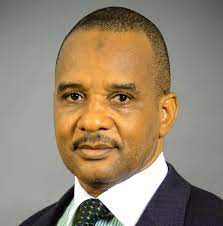Following the coming on stream of the Dangote Refinery a few weeks ago, the Nigerian Maritime Administration and Safety Agency (NIMASA) and the Dangote Group have set up a joint committee to harmonise the operations of the refinery in line with the provisions of the Coastal and Inland Shipping Cabotage Act 2003.
The initiative was informed by the fact that most of the activities and operations of the new refinery, which would basically involve movement of crude oil and refined petroleum products within the country’s coastal and inland waters, would be governed by the provisions of the Cabotage Act, which NIMASA is the sole enforcement agency.
Addressing a delegation from the Dangote Group led by the Managing Director, Dangote Port Operations, Mr. Akin Omole, during its visit to the agency on Tuesday, the Director-General of NIMASA, Dr. Bashir Jamoh, proposed the setting up of an interim joint committee with members comprising both organisations to harmonise all grey areas as they related to the operations of refinery in relation to the Cabotage Act and Guidelines, which was also accepted by the visiting team.
The committee, which has been given two weeks to submit its report has as members NIMASA’s Director, Cabotage Services, Mrs. Rita Uruakpa and the agency’s Director, Internal Audit, Mrs. Olamide Odusanya and two representatives from the Dangote Port Operations, comprising the Managing Director and any other member of staff he might deem fit to nominate.
Jamoh pointed out that the agency had, following the commencement of operations by the Dangote Refinery, received a letter from the Dangote Port Operations, informing the agency of the new development, which the agency replied, highlighting issues that should have been addressed before the commencement of operations.
The NIMASA boss, however, noted that as a regulatory agency, NIMASA did not want to be too strict in enforcing the relevant provisions of the Act that might disrupt operations but opted to wait to hear from the company before taking any action.
He expressed his delight that the management of the company decided to meet with the agency so that all the grey issues and areas would be sorted out.
Janoh said: “The Dangote Group is one of the partners in progress of this Agency in the last 20 years. I have been around at least for 30 years, so I know what I am saying. There is now a new segment and operation of the Group, which is the Dangote Refinery. We’re very proud that the largest refinery in Africa is in Nigeria.
“It will address the consumption shortfalls for petroleum products and cut the foreign exchange spent on importation of refined products and largely reduce over-dependence on foreign products. It will however reduce NIMASA’s revenue but we can’t be selfish because we would have been collecting our three per cent surcharge on imported products, but not minding, we’re delighted to see the refinery working.
“Last year, precisely late November, we received a letter from the Dangote Port Operations and we responded promptly. I think we should put our heads together to address grey areas that could hamper operations. We did not wield the big hammer but we should not do things that would undermine the laws of the land. We need to adhere strictly to the dos and don’ts of the industry so that the refinery would work effectively.
“The committee should strengthen out all the grey areas and get back to us in two weeks; the Director of Cabotage Services should ensure that regulations arising from the relevant provisions of the Cabotage Act are complied with while the Director, Internal Audit is to ensure that every penny accruable to the Agency is paid in full”, the NIMASA boss added.
Earlier in his remarks, Managing Director of the Dangote Port Operations said the aim of the visit was to thank the agency for all its support, noting that without it the successes recorded by the company would not have been possible.
Omole, who confirmed that the refinery had already received six million barrels of crude since last year, hinted that it was expecting more crude oil consignments in the next few weeks.
He explained that the visit was also to enable the company’s management receive briefings from NIMASA on the requirements of the Cabotage Act and guidelines.
The industry expert clarified: “We’re here to seek guidance, direction so as not to violate the law and the rules. We’re aware and conscious that if we violate the rules, the operations of the business might be hampered and that’s why we’re here.”






